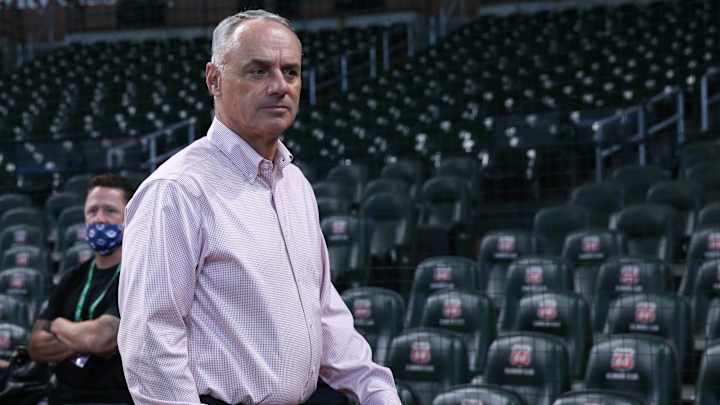Sources: MLB, MLBPA Aren’t Negotiating Pace of Play in CBA Talks

As MLB and the MLBPA negotiate for the future of the sport, one looming issue that stands to threaten the game’s future has gone unmentioned during these prolonged, often contentious discussions: pace of play.
Sources tell Sports Illustrated's Tom Verducci that the idea of a pitch clock, along with other possible adjustments meant to speed up the game, have not been part of the two sides’ negotiations thus far.
While commissioner Rob Manfred has said in the past that he's been in favor of a pitch clock, the league and MLBPA never discussed the issue during the negotiations for the most recent collective bargaining agreement five years ago. MLBPA executive director Tony Clark said he expected to address the topic at a later time, though no developments on that front have occurred. From Verducci:
MLB wanted to introduce the topic into these labor discussions last July. An MLB source familiar with the talks said the owners offered to present to the union its findings from minor league pace of play initiatives, to form a joint committee with the players to study the issue and to begin dialogue. The players “rejected it out of hand,” the source said.
However, a union source said the players later asked multiple times for owners to bring on-field issues into the current CBA talks. The owners did not, the first source said, because the players did not signal unanimity on the issue in July, leading owners to fear further complicating negotiations already bogged down by a multitude of economic issues.
Slight progress was reported in the labor talks Monday. “It felt like actual bargaining,” one source said. Owners added another $5 million to their pre-arbitration bonus pool (now at $20 million) and bumped the size of their draft lottery system from three teams to four. In another new wrinkle, owners proposed that any high-revenue team that pays into the revenue-sharing system cannot take part in the lottery for a second consecutive year—which would mean picking no higher than fifth even if that high-revenue team finishes with one of the four worst records again.
But like most proposals, those represented incremental steps. The two sides are likely to continue such shadow boxing until the end of this week, when a “soft deadline” of Monday injects the most urgency yet. Every day past Monday without an agreement likely takes games off the regular-season calendar.
The league made a new offer during Monday's extended bargaining session, moving on issues related to the pre-arbitration bonus pool and the draft. The two sides are scheduled to meet daily this week, and it remains to be seen whether pace of play will enter into the proceedings.

Nick Selbe is a programming editor at Sports Illustrated who frequently writes about baseball and college sports. Before joining SI in March 2020 as a breaking/trending news writer, he worked for MLB Advanced Media, Yahoo Sports and Bleacher Report. Selbe received a bachelor's in communication from the University of Southern California.
Follow NickSelbe